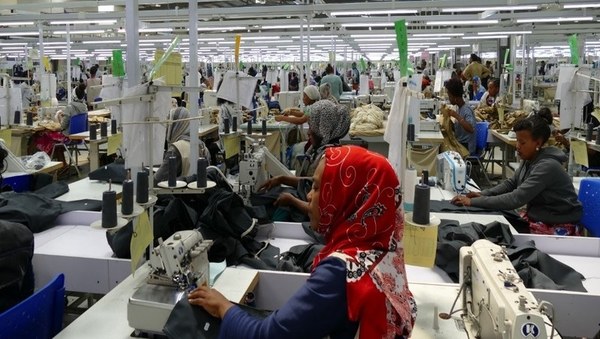Project Labour Turnover (and Absenteeism)
Funded by the Federal Ministry for Economic Cooperation and Development (BMZ), Berlin
Project Duration: 2020 - 2022 (3 years)

Project Abstract
The study Labour Turnover (and Absenteeism) in Industrialising Developing Countries: Research on the Textile Industry in Ethiopia carried out by the Institute of Sociology at the University of Giessen under the project lead of Prof Dr Reimer Gronemeyer aims to examine the phenomena of massive labour turnover and high absenteeism of labourers in the Ethiopian textile industry. The project duration is 2020 until 2022 and the undertaking is funded by the German Federal Ministry for Economic Cooperation and Development.
The relatively young Ethiopian textile industry is supported by the German government with the special initiative Ausbildung und Beschäftigung (Training and Job Creation) , however, has not yet turned out to be as effective as expected. High labour turnover, lacking reliability of labourers along with low productivity jeopardise the rentability, and by extension the success and existence of the newly raised industrial parks.
Managers, who are mostly expats, first and foremost see the problem in the »mindset« of the Ethiopian (female) workers. Most textile operators migrate to urban areas from rural settings and seem to encounter huge challenges adapting to industrialised work ethics.
The study sets a special interest in the perspectives, experiences, interests, and motivations of the labourers. The study follows an interdisciplinary research design. In addition to cultural, industrial- as well as development-sociological questions, it also considers questions from the perspectives of economics as well as industrial and organisational psychology.
This research aims to examine the causes of high staff turnover and absenteeism in the Ethiopian textile industry. The phenomena, that goes along with low productivity, jeopardise the rentability, and by extension the success and existence of the newly raised industrial parks. The relatively young Ethiopian textile and garment industry is supported by the German Federal Ministry for Economic Cooperation and Development (BMZ) with the special initiative on Training and Job Creation that has been designed to foster growth in enterprises to help create jobs.
“The Ethiopian government has adopted an Industrial Development Policy to transform the currently agricultural-led economy into an industry-based one, aiming to lift the population out of poverty and becoming a middle-income country by 2025. The textile and garment industry are considered priority sectors on the path to industrialisation. These sectors are, however, often characterised by precarious working conditions, low wages, non-compliance with human rights and social and ecological standards.
The Federal Ministry for Economic Cooperation and Development (BMZ) and the UK Department for International Development (DFID) co-funded project ‘Promoting Sustainable Growth in the Textile and Garment Industry in Ethiopia’ (eTex II), aims at job-effective growth and social and environmental sustainability of the textile and garment industry. The project is implemented by the German Corporation for International Cooperation (GIZ) GmbH in close collaboration with its political partners.”
Deutsche Gesellschaft für Internationale Zusammenarbeit (GIZ)
Due to different factors such as unsatisfying working conditions, lack of training and career development options, working hours, distance to workplace, salary expectation, etc., many textile factories in Ethiopia encounter problems with high staff turnover. However, high turnover rates cannot exhaustively be explained through economic factors. Various, particularly, social and cultural, reasons play a crucial role, too. Some of them being the agrarian socialisation of the labourers, their strong ties to the rural communities, as well as their cultural (and religious) values. The cultural distance between the labourers and the expectations and norms of an industrialised working environment is intensified by the distance between them and the mostly foreign managers who come from entirely different social and cultural backgrounds. Managers frequently attribute high absenteeism and high break-off rates to the labourers’ »mindset«. Measures for stabilising the workforce have thus far mostly been limited to improving the working conditions in the factories and creating economic incentives, e.g. through performance-related extra pay.
Moreover, the recruitment process is often not yet well-established and sometimes unethical procedures like poaching are part of it. Factories could minimise the turnover rates by improving their human resource strategies how to wisely chose the operators and how to increase job satisfaction and organisational commitment. Having smaller turnover rates will lead to a workforce that is more experienced in the companies’ tasks and procedures, which will automatically lead to higher efficiency and productivity.
In addition, the developments of COVID-19 brings many new challenges to factories. There is a high risk of infections as many people work closely together, workers might be scared to come to work and if many people are infected, production cannot continue as usual. Factories must adapt to this situation and especially the HR department can develop new strategies and concepts how to reduce risks and create a safe working environment for workers.
The research project sets a special interest in the perspectives, experiences, interests, and motivations of the labourers. It follows an interdisciplinary research design: In addition to cultural, industrial- as well as development-sociological questions, it also considers questions from the perspectives of economics as well as industrial and organisational psychology. It ultimately aims to provide recommendations to reduce albour turnover in the Ethiopian textile industry.
Key questions of the study: How do labourers cope with the accelerated industrialisation process? What challenges do they face in the transition from a primarily agrarian to an industrialised living environment? Which life skills and which work ethic do they need in order to work in the textile industry? Or, in other words, which life skills that they acquired to adapt to agrarian living are now a hindrance in their industrial surroundings?
The research project is based on a set of methods consisting of qualitative and quantitative instruments of empirical social science. The causes of high labour turnover and absenteeism will be analysed through the use of narrative problem-focused interviews. The interviews are designed to be group-specific and broken down by gender/sex. There will also be an accompanying quantitative survey of participants’ socioeconomic backgrounds, personal life situation, their working conditions, work satisfaction etc. Additionally, managers as well as government and non-government actors in development cooperation will be included in the research process via expert interviews. Along with other formats, workshops with labourers and managers will be used to devise problem-solving strategies.
The research project builds on the foundation of an extensive data collection and analysis at various locations of the Ethiopian textile industry: The focus of the study will be on the Hawassa Industrial Park (HIP), the Bole Lemi Industrial Zone (BLIZ) and Mekelle Industrial Park (MIP). Finally, in order to enable a comparative perspective, three local textile businesses outside of industrial parks shall be included in the research: 1) the MAA Garment & Textile Factory in Mekelle, 2) Desta in Addis Ababa, and 3) Arbaminch Textile (AT) in Arbaminch and Hawassa.
Interviews with (ex-)labourers and relatives are conducted to find out more about their perspectives, experiences, interests, and motivations concerning the job in the textile sector. In the three different parks and the three local garment businesses, a total of 74 interviews will be conducted with labourers. In addition to that, another 50 interviews will be conducted with ex-labourers, recruiters, factory managers, experts, relatives, scientists/researchers and government executives at the industrial parks.
Furthermore, a quantitative survey (mainly consisting of standardised questions) will be conducted at a total of 5 textile factories (in Hawassa and Addis Ababa). This representative sample (with a total of 380 questionnaire interviews with labourers) is to create a broader data basis, which is meant to supplement and secure the findings from the qualitative survey.

|
Prof Dr Reimer Gronemeyer Principle Investigator, Institute of Sociology, Justus Liebig University Giessen |

|
Prof Dr Tesfaye Semela Kukem Institute of Policy and Development Research, Hawassa University |

|
Prof Dr Ingrid Miethe Institute of Education, Justus Liebig University Giessen |

|
Dr Michaela Fink Research Assistant, Institute of Sociology, Justus Liebig University Giessen |

|
Setisemhal Getachew Teshale PhD Student, Institute of Policy and Development Research, Hawassa University |

|
Markos Gifawosen Mitta Reasearch Assistant, Wolkite University |

|
Hanna Rössner Student Assistant, Institute of Sociology, Justus Liebig University Giessen |
- Interim findings of the project will soon be published in an anthology on Ethiopia's textile and garment industry (publisher: Springer Fachmedien GmbH, Wiesbaden; editors: R. Gronemeyer & M. Fink)
Prof Dr Reimer Gronemeyer
Institute of Sociology
Faculty of Social Science and Cultural Studies
Justus Liebig University
Karl-Gloeckner-Str. 21E (Building H, Office 101)
35394 Giessen, Germany
Tel: +49 641 9923204
Mobile: +49 151 22331133
E-Mail: reimer.gronemeyer
